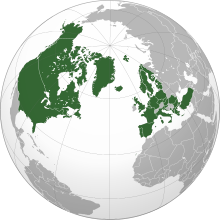NATO troops
| Organisation du Traité de l'Atlantique Nord | |
 Logo  Flag |
|

Member states of NATO
|
|
| Abbreviation | NATO, OTAN |
|---|---|
| Formation | 4 April 1949 |
| Type | Military alliance |
| Headquarters | Brussels, Belgium |
|
Membership
|
|
|
Official language
|
English French |
| Jens Stoltenberg | |
| General Petr Pavel, Czech Land Forces | |
| General Curtis Scaparrotti, United States Army | |
| Général Denis Mercier, French Air Force | |
| Expenses (2017) | US$946 billion |
| Website | NATO.int |
The North Atlantic Treaty Organization (NATO /ˈneɪtoʊ/; French: Organisation du Traité de l'Atlantique Nord; OTAN), also called the North Atlantic Alliance, is an intergovernmental military alliance between three of the five official nuclear-weapon states with the power to veto at the United Nations Security Council (United States, France and the United Kingdom) and 26 other North American and European countries. The alliance is based on the North Atlantic Treaty that was signed on 4 April 1949. NATO constitutes a system of collective defence whereby its independent member states agree to mutual defence in response to an attack by any external party. NATO Headquarters are located in Haren, Brussels, Belgium, while the headquarters of Allied Command Operations is near Mons, Belgium.
NATO was little more than a political association until the Korean War galvanized the organization's member states, and an integrated military structure was built up under the direction of two US Supreme Commanders. The course of the Cold War led to a rivalry with nations of the Warsaw Pact, that formed in 1955. Doubts over the strength of the relationship between the European states and the United States ebbed and flowed, along with doubts over the credibility of the NATO defense against a prospective Soviet invasion—doubts that led to the development of the independent French nuclear deterrent and the withdrawal of France from NATO's military structure in 1966 for 30 years. After the fall of the Berlin Wall in Germany in 1989, the organization conducted its first military interventions in Bosnia from 1992 to 1995 and later Yugoslavia in 1999 during the breakup of Yugoslavia. Politically, the organization sought better relations with former Warsaw Pact countries, several of which joined the alliance in 1999 and 2004.
...
Wikipedia
